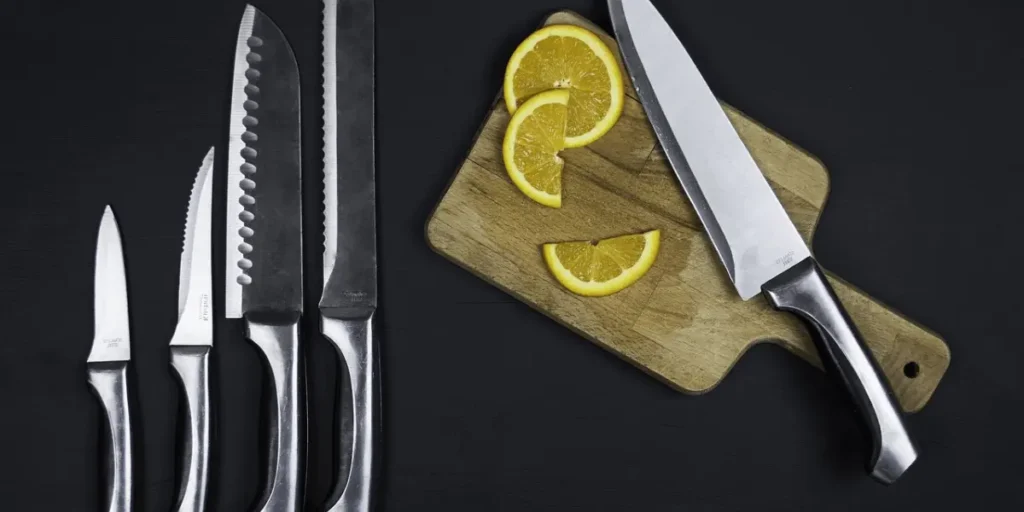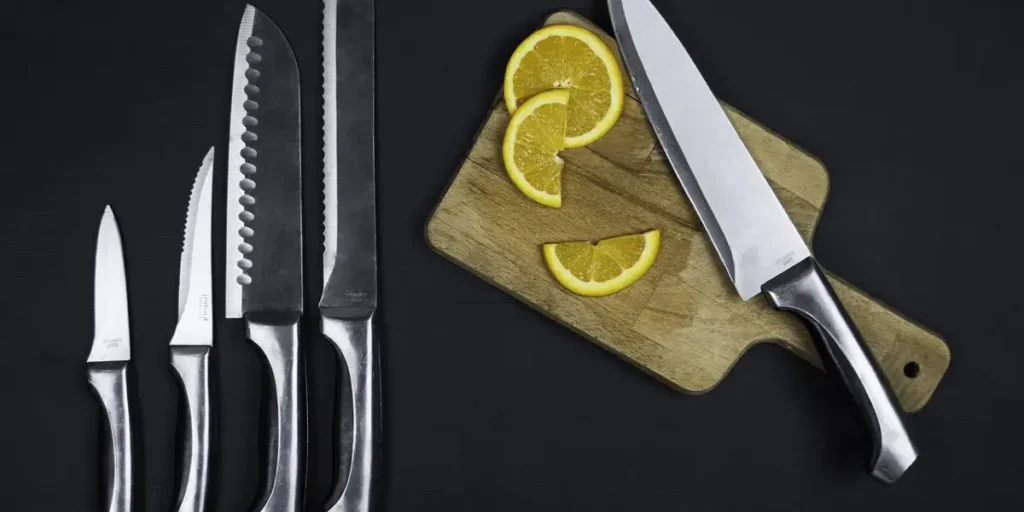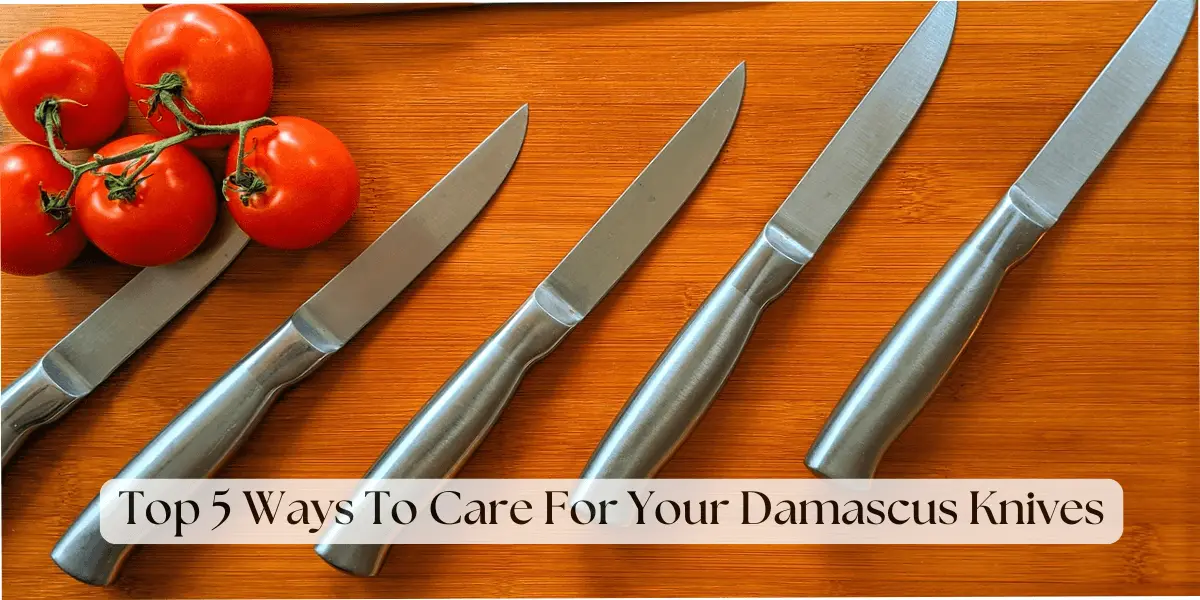Damascus knives have inherent beauty in the attractive wavy patterns, which make them beautiful additions to any kitchen or collection. Special care needs to be taken for the knives made through the process of layered forging in different kinds of steel so that they do not become dull and rusty and preserve the gorgeous Damascus pattern.
Here are the top five ways to care for your Damascus knives, ensuring they remain sharp, rust-free, and still gleaming with brilliance after years of care and Maintenance of Damascus Knives.
Close-up of a Damascus knife with distinctive patterns. Alt text.
Top 5 ways to take care of your Damascus knives: Guide to step-by-step management

Top 5 Ways To Care For Your Damascus Knives
Make sure to follow these top 5 ways to take care of your Damascus knives. Ensure that you have an idea when should you clean your knives.
-
Clean Your Damascus knives after each use
The Damascus knife requires to be cleaned after every use like a wood burned cutting board because the Damascus steel is not all stainless material and therefore may rust or tarnish if it is exposed for too long to moisture or acidic products.
To clean a Damascus knife properly:
- Hand Wash Only: Always wash your knife by hand using warm soapy water. Never put a Damascus knife in the dishwasher; the chemicals of the detergents and the superhot steam disintegrate the steel, encouraging corrosion; as well as the intense heat and movement can dull the edge and even warp the blade.
- Prevent abrasive sponges: Clean the steel using a soft sponge or gentle cloth without scratching and tearing off the blade pattern. Steel layers forming the Damascus pattern may get easily worn out if one uses hard scrubbing pads; then, it tends to dull its appearance with time.
- Rinse Thoroughly: After using soap, rinse the knife using clean running water to eliminate residue. Any remaining soap or food particles will encourage rust or tarnish if they remain on the blade.
- Dry Right Away: Dry blade right away after cleaning and rinsing by wiping the blade with a soft cloth. Let the knife air dry this results in leaving water spots, rust, or discoloration.
Clean Damascus knives well to avoid the corrosion and build-up that can obscure the etching pattern applied and result in the beauty of Damascus knives. This step is crucial for care and Maintenance of Damascus Knives
-
Lubricate the blade regularly: Avoid rust
Damascus steel, although tough, is susceptible to rust if not taken proper care of. Often oiling the knife blade will provide a protective coating that prevents moisture from reaching the blade and maintains its integrity.
To oil your Damascus Knife:
- Select food-grade oils: Mineral or camellia oil is best because these oils leave a very thin barrier on the blade, which in turn protects it from oxidation and moisture without influencing the flavour of food.
- Apply Sparingly: Once the blade is completely dry, apply a few drops of oil on a soft cloth and rub evenly all over the blade, both sides..
Keep the blade of a knife lubricated, weekly for knives used daily or every clean for knives not being used as often. This will prevent rust and keep it looking fine. Oil more often if the ambient humidity is quite high.
To Care and Maintenance of Damascus Knives, follow the third step. A Damascus knife should be kept sharp because an ignorant blade is much more deadly than a dull one. However, the arrangement of the structures of Damascus steel makes it such that only with proper techniques and tools of honing and sharpening the blade can the latter function properly.
Sharpening Honing resurfaced the honing edge to maintain the sharpness until sharpened. Ceramic honing rod- Use a ceramic rod instead of a steel, Damascus steel prefers a ceramic rod. Keep your knife at a constant angle of 15 to 20 and draw the knife down the rod multiple times on either side.
- Sharpening: A whetstone is used for actual sharpening. Start with a coarser grit stone (approximately 1,000 grit) in case the knife is dull, and then progress to a finer grit stone (3,000-6,000 grit) for final sharpening touches. Maintain consistency in the angle at which sharpening is done, usually 15-20 degrees.
- Do Not Use Electric Sharpeners: Electric sharpeners are too aggressive for Damascus steel. They chip or break the blade easily. In addition, they tend to remove more material than necessary, thereby consuming your knife sooner.
Proper honing and sharpening keep the blade keen and effective; in addition, no chip or wear develops anywhere it should not on the intricate layers of Damascus steel.
How to Store Your Damascus Knives - Top 5 ways to care for your Damascus Knives

How to Store Your Damascus Knives - Top 5 ways to care for your Damascus Knives
Storage is very important in preserving the Damascus knives especially if you want to gift them. Should they fail to be stored well, they will be left dull, not to mention scratched; although, in that moist condition, it could rust.
- Use a Knife Block or Magnetic Strip: A knife block or magnetic strip is perfect for Damascus knives as it will place the blade under protection and decrease the chance of getting damaged. More so, magnetic strips are handy since they will suspend the knife aloft away from moisture and make easy access easier.
- Avoid Using a Drawer to Store Them: It tends to chip, scratch, and blunt because of the blade banging against other cutlery. If you must store them in a drawer, then use blade guards or sheathes to protect the edges.
- Store in a Dry Cool Place: This will avoid any rusting and corrosion. Do not place the knives near the sink or stove as moisture or heat may cause condensation that sometimes is hard to notice but eventually promotes rusting.
Proper storage will keep your Damascus knives looking pristine. Moreover, it will keep them sharp and durable.
- Never use Damascus knives on harder surfaces
While Damascus knives are made to be powerful, hitting them against hard materials will just do nothing but dull their edge or even make a hole in them. To keep your knife sharp and working well:
- Use a wooden or plastic cutting board: These provide a forgiving surface that will not dull or chip the blade. Hardwood boards made from maple or walnut wood are recommended very highly since they are dense enough to cut but soft enough to protect the knife.
Ways to take care of your Damascus knives - Alt text
- Avoid Glass, Granite, or Ceramic: Gritty materials such as glass, ceramic, or granite can be too abrasive for the blade of a Damascus knife. It can cause severe damage and lose out on its fine edge from these tough surfaces by chipping.
- Opt for an end-grain cutting board: Nothing preserves the sharpness of Damascus knives quite like an end-grain board. These boards have fibres that "give" when cut, reducing impact and wearing less off your blade.
The right cutting surface can greatly increase the time that a Damascus knife can be kept sharp without being damaged, thus keeping it able to perform as well over time, says a cutter.
Damascus knives caring tips - Alt text
Additional Care for Damascus Knives in the Long Run
In addition to these five main care steps, here are a few tips that will keep your Damascus knives in top condition over the long run. Follow these tips for Care and Maintenance of Damascus Knives.
- Avoid acidic foods: Use citrus, tomatoes or vinegar and the blade will corrode if the knife is left to stand for any period using these acidic food items. Sharp the blade immediately after cutting acidic food items to prevent permanent staining or corrosion.
- Avoid Heavy-Duty Activities: Damascus knives are strong; however, they are generally applied for slicing, chopping, and a general kitchen knife. Avoid using knives in more heavy-duty activities, such as prying or opening cans, or cutting through bones, to avoid damaging your blade.
- Check the Knife: Every two weeks, examine the handle, rivets, and blade for damage and wear. Minor problems such as tightening a loose handle or touching up a small rust spot can prevent big problems from ever arising in the future.
Conclusion
A Damascus knife is a chameleon, requiring careful attention and constant care, but such care allows a knife to be passed down through generations with unadulterated beauty, sharpness, and integrity.
Regular cleaning, proper oiling, careful sharpening, mindful storage, and the use of appropriate cutting surfaces are some of the practices that can ensure quality and unique patterning for your Damascus steel. By following these top five care methods, you’ll ensure that your Damascus knives not only perform well but also retain their stunning appearance, making them a functional piece of art in your kitchen.


